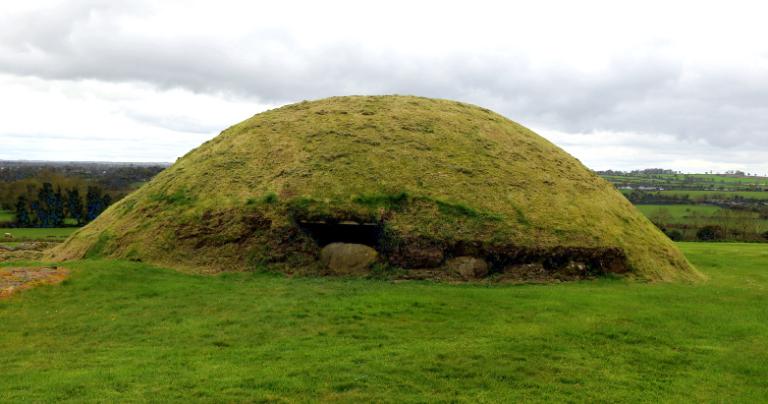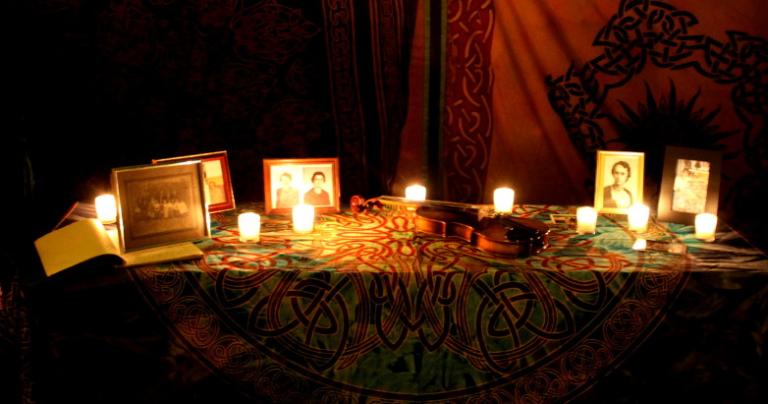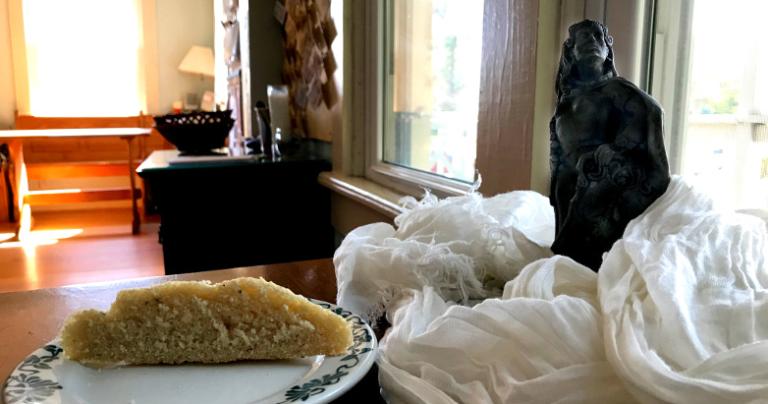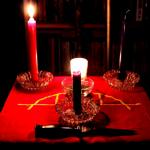In writing the last post on The Aesthetic of Witchcraft, I realized that while I’ve made frequent reference to “The Big Questions of Life” over the years I’ve never devoted a post specifically to these questions. I’ve listed some of them from time to time, but mostly I’ve just assumed everyone knows what I’m talking about, in general if not in particular.
Assumptions are often wrong. And even if many readers have a general understanding of the Big Questions of Life (I think most of you do) the fact that I keep mentioning them means they’re something I need to discuss in more detail.
The usual disclaimers apply: this is my list of questions and my responses to them. There is no Pagan orthodoxy in this matter, as there is no Pagan orthodoxy anywhere. But I’m a Pagan and a polytheist, so this is a Pagan and polytheist approach. A Christian approach or an atheist approach or a Buddhist approach would be different, perhaps subtly and perhaps radically.
What is a Big Question of Life?
The capitalization is a hint – it’s something important. Really important. And it’s something universal to humanity, matters we all encounter whether we are young or old, rich or poor, sick or healthy.
The Big Questions of Life call us to step beyond the immediacy of our day to day lives and to think about deeper matters. They ask us to live our lives consciously and intentionally. They help us understand the difference between surviving and living.
And sooner or later they inject themselves into our lives and demand that we deal with them whether we want to or not.
Why should we try to answer them?
For me, this question is harder than any of the actual Big Questions of Life. I can’t imagine why anyone would not want to try to answer them. I’m eternally curious – if there’s a question, I want to find the answer. Or at least, an answer.
I understand: some people are so caught up in day to day life they don’t have time for philosophical contemplation… though I would suggest that many of them would be less caught up if they spent a little more time asking themselves why they’re doing what they’re doing and if there might be a better way to live. And busyness aside, some people just aren’t interested in thinking deeply.
But this we know: all that is born will some day die. Even if you refuse to deal with everything else, you must deal with the matter of death. The time to do that is not when death is upon you (either your own death or the death of someone you love) but on a beautiful Sunday afternoon when the sun is shining and all is right with your world.
Think about the Big Questions of Life now, so that when they intrude into your life, you have answers (or at least, approaches) that are helpful and satisfying to you.
Partial answers and provisional answers are better than no answers
Philosophers, theologians, and ordinary people have contemplated the Big Questions of Life for at least as long as we’ve been human. They have many ideas, but no definitive, black and white answers.
We have a name for people who claim to have certain answers where no certainty is possible: fundamentalist. We have a name for people who claim to have simple and easy answers to deep and complex questions: wrong.
Given the inherent uncertainty around the Big Question of Life, some people decline to engage them. Or they claim that since we can’t know for sure, any answer is as good as any other.
But some answers are clearly wrong, while others are less wrong. Some answers provide comfort and inspire us to keep going in difficult times. We can accept a partial or provisional answer and enjoy its benefits, and then continue working with the questions. If we later find a better answer, we can adjust our beliefs accordingly. Hold loosely but practice deeply.
More than that, there is value in the process of contemplation. Asking the questions, considering their implications, examining the various theories and philosophies and evaluating their effectiveness helps us understand the questions better, even if we are ultimately unable to come to any definitive conclusions.
Now let’s look at some of the specific Big Questions of Life.
Where do we come from?
The straightforward answer is that we come from our parents. This is simple to the point of pedantry, but it points in a helpful direction: we came from our ancestors. We are here because of those who came before us. If it wasn’t for them, we would not have life, much less all the things that for better or for worse make up our human society.
Honoring our ancestors is a foundational component of my Pagan and polytheist religion.
We can easily contemplate our many-great human grandparents. It’s harder, but we can also contemplate our pre-human ancestors, going all the way back to the first single-cell life on Earth.
But where did that ancestor come from? Even if we accept the hypothesis that the origins of life are purely chemical, we are still left with the matter of the origin of the universe.
Mainstream science can trace those origins back to a fraction of a second after the Big Bang. But at the instant of the Big Bang – much less before – the laws of physics break down. String theory and other ideas to explain this are so far untestable and as much speculation as science. Which is not to say we should dismiss them outright, only that we should be careful how much weight we give them in our religious and philosophical endeavors… particularly considering their materialist assumptions.
Fundamentalist Christian creationists claim their God created the universe. When asked “where did your God come from?” they claim he always existed. If a God can exist eternally, then there’s no reason why the universe can’t exist eternally.
More than any of the other Big Questions of Life, “where do we come from?” is ultimately unanswerable. I prefer to focus on my ancestors and leave the rest to others.
Why are we here?
Where ever we came from, we are here, living on the Earth. Why? What is our purpose in life?
There is an unstated assumption in this question: that humans actually have a purpose, either collectively or as individuals or both. And there’s a further assumption: that humans have a purpose and other species do not. Or if they do, it’s in support of a greater human purpose.
But evolution and the genetic information that support it show that we are more like our fellow animals (and possibly, plants) than we are different. Animism – another foundational component of my Paganism – says that all beings are persons worthy of dignity and respect.
Before we can answer the question of our purpose, we must understand that life isn’t all about us. Humans are one species out of many. An inordinately powerful species, to be sure, but might does not make right – quite often the opposite.
Observation tells us that life has one purpose: to continue. Clearly life continues collectively. Whether or not it continues individually is its own Big Question.
Our purpose as individuals is what we make it. I believe strongly in free will. Destiny is the cumulative effect of our choices, including those choices we don’t recognize as choices, and including the choices that were made for us by parents, teachers, and society at large.
Which leads to the next Big Question…
How should we live?
If you want a good survey of how various philosophers have answered this question over a couple dozen centuries, read Brendan Myers’ book The Earth, The Gods and The Soul. If you want my answers, read on.
Live in relationships. Humans are not solitary animals – we are social creatures. Life is best lived in relationships with other humans, with other species, and with our Gods and ancestors. These relationships should be based in mutual respect, in hospitality, and in reciprocity: “I give, so that you may give, so that I may give again.”
Build a better life for yourself. Destiny is the cumulative effect of our choices. Where are the choices you’re making today leading you? If you don’t like the road you’re on, make some changes. We have strong evolutionary urges to think short-term. Sacrificing today for a better tomorrow requires conscious intention. Think about it, make plans, and then act.
Build a better world. Remember that destiny is also the cumulative effect of the choices others make for us. Those of us who have the intellectual, financial, and other resources to make the world a more just, more fair, and more compassionate place for all have an obligation to do so.
But enjoy life today. Eat good food. Drink good wine. Enjoy art and entertainment. Travel – if you do nothing else, travel. Life is short and hard and we are not guaranteed tomorrow, much less a life after this life. Enjoy what you can while you can.
At the heart of Paganism is the belief that despite all the very real pain and suffering, life is good. These are the things that make it all worthwhile. They require compromises and tradeoffs – how much do we live for today, how much for tomorrow, and how much for others? Different people will strike different balances, and that’s OK. But these are the four keys to a happy and virtuous life.
Good and evil
Most Pagans reject the dualism of good and evil. Much of this is due to Christians who define good as “what we think our God wants” and evil as “what we think our God hates”… and of course, their God just so happens to hate the very same people and things they hate.
Good is fairly easy to recognize, even if we realize there’s more than a bit of relativism in it. What’s good for the cheetah is not good for the gazelle, and vice versa. In whole, dynamic balance is good because it is sustainable and minimizes suffering, while both stasis and extremism are bad because they lead to greater suffering.
Evil defies definition. Yet when we see things like the Las Vegas mass shooting and last Sunday’s church shooting here in Texas, there is no other word that fits. We try to explain these horrendous acts in terms of mental illness, but that ignores that fact that the overwhelming majority of people with mental illness are not violent, much less commit mass murder.
I do not deny the existence of Satan, but I do not believe he is a God of Evil. The phrase “forces of evil” belongs in a cheap horror movie. “The devil made me do it” is a weak excuse for human failings and poor choices.
In his 1978 book The Road Less Traveled M. Scott Peck described evil as the combination of narcissism and laziness – when someone is willing to harm and even kill others rather than face the suffering that is necessary to learn and grow. This makes more sense than anything else I’ve read. Evil exists – it is a murderous selfishness.
Note: The Road Less Traveled was very helpful in the early days of my Pagan journey. Peck’s later books are explicitly Evangelical and are far less useful to Pagans and other non-Christians.
The matter of the Gods
In The Path of Paganism I wrote:
There is perhaps no bigger (and no more dangerous) question than that of the Gods. What are they? Who are they? What do they offer us, and what do they want in return? There are many possible answers.
In Reclaiming Civilization Brendan Myers wrote:
The worship of the gods is not what matters.
I think both of these statements are true. Later in that same paragraph, Myers wrote:
The gods, if they exist, are not laws to obey; they are presences to be experienced.
I’m a polytheist. I see the Gods as real, distinct, individual beings – as presences to be experienced. I believe it is good and right to worship Them, and I believe it is helpful for humans to worship Them. Worship is the best way to experience the Gods, to form relationships with Them, and to begin to embody Their virtues and values.
Polytheism teaches that different Gods call different people to serve Them in different ways. Worship seems to be a requirement for those of us who are called to deeper service, not a universal obligation. If I were to stop my worship of Cernunnos, Danu, the Morrigan, and others, I am certain the consequences would be severe. Others have not made the promises I have made, and are under no such obligation.
There is reason to doubt the historicity of the Marcus Aurelius quote I see on Facebook from time to time, but it’s still true:
Live a good life. If there are Gods and they are just, then they will not care how devout you have been, but will welcome you based on the virtues you have lived by. If there are Gods, but unjust, then you should not want to worship them. If there are no Gods, then you will be gone, but will have lived a noble life that will live on in the memories of your loved ones.
What happens when we die?
This is perhaps the biggest of the Big Questions and it deserves its own post. As it happens, I wrote just such a post back in August. I encourage you to read it at your convenience – here’s a brief summary.
I expect that as I die I will be met by an ancestor or other spiritual ally who will guide me into the Otherworld for the final time. I expect to experience a time of rest and review. I expect to spend some time working on various things on the other side. And then I expect to be reborn into this world to start the process all over again.
And I also expect that I’m wrong about at least part of that. Death is a mystery, and my beliefs are a subjective combination of tradition, experience, intuition, and logic. The uncertainty is great – the odds on me or anyone else getting it exactly right are impossibly long.
Who am I?
Most cultures throughout most of history have rooted identity in the family, the tribe, and the religion. Modern Western culture grounds identity and autonomy firmly in the individual. This gives us tremendous freedom, but it also overwhelms us with more options and alternatives than we can manage.
When we contemplate the Big Questions of Life, we start to form answers – our own answers. The deeper we go, the better we understand the world and the way it works, and the better we understand ourselves.
Some ideas are clearly true, some are clearly false, and many are hard to tell. Some are helpful while others are harmful, thought it always helps to recognize if you’re a cheetah or if you’re a gazelle.
These questions are too big for simple answers, and anyone who promises a simple answer is trying to sell you something… or trying to get you to sell your soul to them. Ignore those who are selling a black and white world, and explore your own answers in the brilliant spectrum of the Big Questions of Life.






















